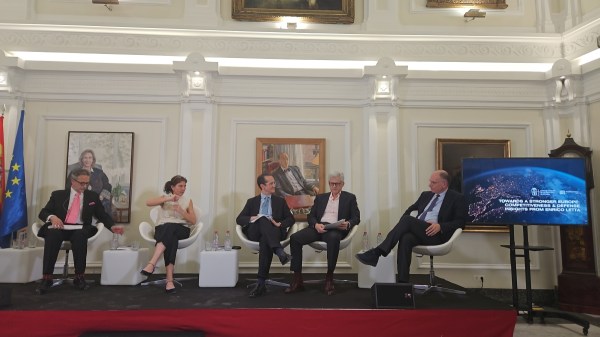Unity, determination and solidarity
“We have to be prepared for the worst, hope for the best and act together”, said Nadia Calviño, Spain’s Vice-President of the Government and Minister of Economy, during the forum “Tech & Politics“, organised by the Financial Times and ETNO. The event brought together industry CEOs, policymakers, investors, NGOs, civil society and experts on 26 September to discuss issues on the digital policy and regulatory agenda.
In this context, Nadia Calviño reviewed the economic challenges facing the European Union in the coming months and stressed that the values of unity, determination and solidarity that prevailed during the pandemic should also guide us in these times of uncertainty. The Vice-President acknowledged that the private sector had been a fundamental pillar for the recovery and continues to be so in order to successfully undertake the digital and green transitions.
Dynamic competition and the evolving digital ecosystem
In her mention of the private sector, the Spanish government representative warned of the complex situation of the European telecommunications sector. “Telecommunications companies are finding it very difficult to compete with digital platforms”, she said. With the aim of achieving a level playing field between telecommunications platforms and operators, Calviño supported the need to find a fairer model for technology companies to contribute to network investment that takes into account the evolution of the digital ecosystem.
This approach also applies to the consolidation moves that are taking place between telecommunications operators in countries such as Spain. The Vice-President defended the adaptation of policies to the dynamic competition that the sector has been experiencing in recent years. “The European Commission has not written anything in stone (…) I think we have to assess effective competition in the context of reality, which is evolving and changing,” she said.
Telecoms, Europe’s leading technology sector, needed to drive strategic digital autonomy
Laura Abasolo, General Director of Finance and Control for Telefónica S.A. and responsible for Latin America, supported these statements during her participation in the panel on “A new industrial and innovation policy for Europe“. The Telefónica representative stressed that telecommunications is the main European technology sector that is not only building connectivity, but also digital services.
This process is the result of the evolution of the sector over the last decades to support and drive the digital era. For example, Telefónica has moved from voice to data, from data to digital services and from there to artificial intelligence on the road to the metaverse. It provides connectivity, and technologies that help modernise infrastructures, but it also drives innovation, offers services to accelerate the digital and green transition of SMEs in different sectors and helps strengthen industrial ecosystems. These opportunities make the sector a key ally in driving Europe’s digital autonomy.

Innovation, digital objectives and return on investment
Despite the opportunities, the sector needs policies to help to promote innovation, increase return on investment and gain scale to drive European digital leaders.
The telecommunications sector has evolved substantially since its liberalisation 25 years ago. Market dynamics have changed with increased competition and the rules remain basically the same. However, Europe’s strategic priorities emphasise the need for investment and innovation. Although “there is no magic number of operators”, as Laura Abasolo confirmed, competition policies must evolve to tackle the problem of fragmentation in Europe’s telecoms sector. Otherwise, the sector’s investment capacity will continue to shrink.
Moreover, operators are concerned about the exponential increase in data traffic on the networks. Just six companies alone generate more than 56% of total internet traffic, Abasolo pointed out. However, operators bear the total investment, while platforms do not contribute to the costs of delivering traffic to end customers. In line with Nadia Calviño’s statements, the Telefónica representative warned that operators are not being able to monetise this increase in traffic and even added a figure: “A fairer contribution to network investment will be fundamental to close the gap of the 300 billion euros we need to connect the European Union”.
Guillaume Boutin (CEO of Proximus) concluded that there is an urgent need for the EU to create an ecosystem that facilitates investment and allows innovation to flourish.
No green transition without digitisation
A fair contribution would also encourage the developments of low-carbon platforms and solutions, a reduction in data consumption and a consequent reduction in energy consumption. As Laura Abasolo reminded: “There is no green transition without digitalisation” and therefore no green transition without telecommunications networks and connectivity solutions.
Francesca Bria (President of the Italian Innovation Bank) also supported these ideas. Bria stressed that digital transformation should serve to transform the European economy, move towards a more inclusive model and accelerate the green transition. “It is important not to replace old dependencies with new ones,” Bria said.
Although it is understandable that the European Union is currently focusing on energy autonomy, Abasolo reminded us that we must not forget the digital dimension. It can even be the lever that accelerates the green and energy transition. ICT technologies and solutions have the potential to reduce global emissions by 15-35% by 2030.
A future-proof industrial policy
Designing a future-proof industrial policy is the key success factor for boosting Europe’s competitiveness, innovation and strategic autonomy. This approach implies having a clear long-term strategic vision of what we want Europe to be and what role we want it to play globally.
This vision, combined with a deep understanding of the current geopolitical, economic and technological landscape, will enable Europe to define the right policies to strengthen the resilience and growth of industries in the face of current and future challenges.











